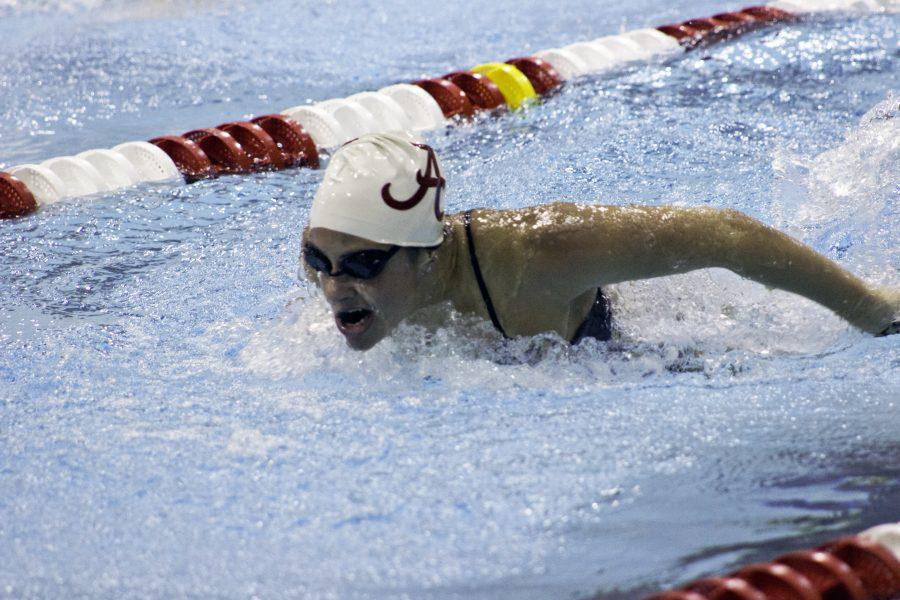By Kyle Simpson | Staff Columnist
Sports are a huge part of life all around the world, and competing in athletic events is an extremely fulfilling and important endeavor for millions of people. Testing the physical and mental ability of your body against that of another is an experience like no other, so it’s understandable why so many are drawn to play sports – they’re fun, healthy, challenging and exciting. Being a year-round swimmer for most of my life and now competing for the University, I have experienced the highs, the lows, the pressures and the difficulties that come inherently with athletics, and an athlete’s perspective on body image issues may be a little different than others’.
For athletes, the pressure to have the “perfect” body is often a double-edged sword. They must juggle the pressures to look the way society calls for while also having to physically perform their sport. Athletes compare themselves to their teammates and competitors, and a negative general body image is often compounded with unhealthy comparisons to their teammates and competitors.
It’s different for everyone. For several years when I began swimming, I wasn’t confident in the way I looked. I thought I was too chubby to be a swimmer and wondered why I didn’t look like I thought swimmers were supposed to look. I went through periods where I was embarrassed to swim, even though I was getting pretty good. It was hard to get over, because the desire to look a certain way comes from even more sources than usual for athletes. Pressures from coaches and teammates and a desire to improve performance can foster an unhealthy relationship with one’s body image. Since the time of the famous sculptors of Greece and Rome, athletes have been expected to look a certain way, even if those expectations aren’t realistic. It doesn’t help that, for many sports, uniforms are necessarily far more revealing than normal clothing. Someone who is self-conscious about his body is likely not going to feel better while wearing a Speedo, for example.
People usually begin to seriously play sports in adolescence – right in the middle of formative, vulnerable years when eating disorders and unhealthy self-image issues are most likely to develop. Because of the added pressures on athletes to look a certain way, unfortunately many will chose to not play the sports they love, or worse, develop a negative body image that destroys their self-confidence and can lead to more problems. An eating disorder can also potentially be more dangerous for an athlete, who likely burns far more calories during training than a normal person, putting them at risk for injury and other health risks more quickly, and cruelly, making them far less likely to succeed in their sport.
The truth is that, just as the way your body looks doesn’t change who you are, having the “perfect” body for a particular sport doesn’t make you more likely to be the best. When we think of a stereotypical tennis player, swimmer or quarterback, there is a specific body type that comes to mind, sure. But most of the time, the best athletes don’t necessarily fit the mold, and often, their bodies are dramatically different. The greatest female tennis player of all time is Serena Williams, and the muscles and build that allow her to play with so much power make her look a little different than most tennis players, but that’s okay – 21 (and counting) Grand Slam titles don’t lie. American swimmer Ian Crocker didn’t have the six-pack that you would expect from an Olympic Gold Medalist and world record holder, but he’s considered one of the best butterflyers in history, and it took six years for Michael Phelps to finally break his record. Drew Brees, the quarterback of the New Orleans Saints, is far shorter, at a generous six-foot-nothing, than most elite NFL quarterbacks, but he has rewritten the record book and was a Super Bowl MVP.
If these athletes had allowed self-consciousness about their bodies to prevent them from playing the sports that they loved, we would have missed out on some incredible careers – that’s why it’s so important to promote healthy relationships with food and body image among young athletes. Athletics have been an incredibly healthy and fulfilling part of my life, and everyone should have that opportunity not marred by a negative body image.
Kyle Simpson is a junior majoring in biology. His column runs weekly.









